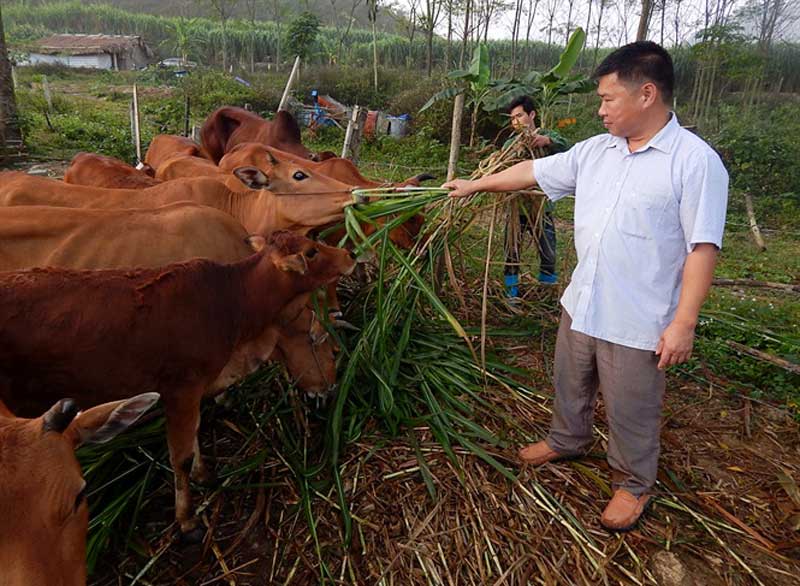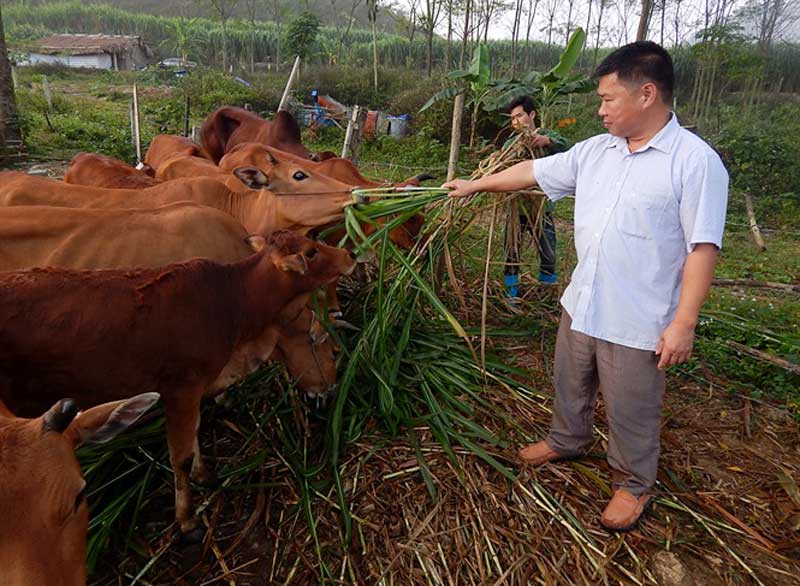
(HBO) – Luong Van Suong, a resident in Na Loc village, Dong Chum commune (Da Bac district) started his agricultural business not by growing rice, maize or any other food crops but grass. The man’s determination has been translated into a persuasive economic model, helping him gain the title of "Vietnam’s excellent farmer” last year.

Luong
Van Suong has dedicated his efforts to cow raising and passion fruit farming,
earning millions of VND on an annual basis.
Everything began in 2012 when Suong knew he needed to switch to a
new production model and was interested in growing grass for cow and buffalo farming.
After careful consideration, he used five hectares of his family’s corn field
to grow crass, offering a good source of nutrition for his cattle to be healthy
and thrive. The herd now grows to 150 heads, producing between 20 and 40 calves
and generating more than 300 million VND each year.
He also offers jobs to poor families by contracting them to raise cows
and buffalos, who will raise the cattle till they produces calves and give back
half of their profits from the cattle to Suong. The service has helped many
needy households escape poverty.
In 2016, Suong invested in 10 hectares of clean passion fruit
plantation, with all fruit harvested sold to a processing company. In the first
fruit crop, the garden yielded 60 tonnes of fruit, reeling in around 100 million
VND.
Suong’s business has also created stable-income jobs for dozens of
local labourers.
As Suong moved forward with his agricultural projects, he learned
the danger of herbicide. He then became the first in his locality to encourage
people to say no to the dangerous substance. One-hundred percent of households
in Na Loc signed an anti-herbicide commitment and agreed to make it part of the
village’s informal common law. The campaign spread throughout Dong Chum commune
and local people agreed to follow the commitment since January 1, 2017, with no
violations spotted to date. Dong Chum was the first commune in Da Bac district
and Hoa Binh province to successfully launch the campaign.
Suong now began raising free-range chickens on his fields. He said
when people used weed killers rampantly, the method was impossible, as the
chickens kept dying of herbicide poisoning. Now, the environmentally friendly
free range farming has been proved effective and attracted increasing
involvement of local farmers./.
According to data from the Hoa Binh Provincial Party Committee, the industrial production index for the first six months of 2025 is estimated to have increased by 20% compared to the same period last year. This marks the highest year-on-year growth rate for this period since 2020.
In the first six months of 2025, Hoa Binh province’s export turnover was estimated at 1.145 billion USD, marking an 18.11% increase compared to the same period in 2024. Import turnover was estimated at $ 804 million, a 17.15% increase, which helped the province maintain a positive trade balance.
The lives of the ethnic minority farmers in Tan Lac district have gradually improved thanks to the new directions in agricultural production. This is a testament to the collective strength fostered through the professional associations and groups implemented by various levels of the district’s Farmers’ Union.
With the motto the "product quality comes first,” after nearly one year of establishment and operation, Muong village’s Clean Food Agricultural and Commercial Cooperative, located in Cau Hamlet, Hung Son Commune (Kim Boi district), has launched reputable, high-quality agricultural products to the market that are well-received by consumers. The products such as Muong village’s pork sausage, salt-cured chicken, and salt-cured pork hocks have gradually carved out a place in the market and they are on the path to obtaining the OCOP certification.
In the past, the phrase "bumper harvest, rock-bottom prices" was a familiar refrain for Vietnamese farmers engaged in fragmented, small-scale agriculture. But today, a new spirit is emerging across rural areas of Hoa Binh province - one of collaboration, organisation, and collective economic models that provide a stable foundation for production.
Maintaining growing area codes and packing facility codes in accordance with regulations is a mandatory requirement for agricultural products to be eligible for export. Recently, the Department of Agriculture and Environment of Hoa Binh province has intensified technical supervision of designated farming areas and packing facilities to safeguard the "green passport" that enables its products to access international markets.



